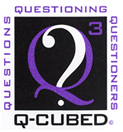Maegan Lopez: "I was proud of myself."
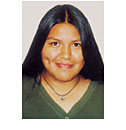 Maegan Lopez says she knew right away that working in a lab would be the perfect place to spend her summer. "I was pretty excited," says Lopez, a Baboquivari High School student whose future plans now include becoming a cardiologist. "I'd never worked in a hospital." Even though Lopez boasts an acute interest in science, the program's emphasis on questioning was challenging. "It was fun and hard," she says. "I don't usually ask questions or question myself, really." Lopez, who worked with Jack Copeland, MD in the Artificial Heart Program, says her biggest challenge during the SIMI came during the final presentations, when students displayed their research in a power-point presentation. She admits to being nervous at first, but smiles as she remembers her project. "I was really proud of myself," she says.
Maegan Lopez says she knew right away that working in a lab would be the perfect place to spend her summer. "I was pretty excited," says Lopez, a Baboquivari High School student whose future plans now include becoming a cardiologist. "I'd never worked in a hospital." Even though Lopez boasts an acute interest in science, the program's emphasis on questioning was challenging. "It was fun and hard," she says. "I don't usually ask questions or question myself, really." Lopez, who worked with Jack Copeland, MD in the Artificial Heart Program, says her biggest challenge during the SIMI came during the final presentations, when students displayed their research in a power-point presentation. She admits to being nervous at first, but smiles as she remembers her project. "I was really proud of myself," she says.
Elyce Antone: "I was excited."
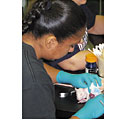 Elyce Antone says her summer in the Lymphology Laboratory made one thing very clear: she loves a challenge. Antone, a student at Baboquivari High School, plans to become a doctor and continue the research she started this summer. Her initial attraction to the SIMI, she says, was the idea of working in a real laboratory. Once there, working with Marlys Witte, MD in the Lymphology Lab, she says she thrived on the idea of obstacles. "I saw it (the program) as a very good challenge," Antone says. "You run into problems and it's a challenge to get through them." Antone admits that completing her lists of questions in the ignorance logs was the most difficult part of the summer -- especially as she became more confident scientifically. "It's sometimes hard to admit what you don't know," she says. Still, her summer job in the laboratory was an introduction into many real-life skills, she says. "I was very excited," she says. "I had pride to be working there."
Elyce Antone says her summer in the Lymphology Laboratory made one thing very clear: she loves a challenge. Antone, a student at Baboquivari High School, plans to become a doctor and continue the research she started this summer. Her initial attraction to the SIMI, she says, was the idea of working in a real laboratory. Once there, working with Marlys Witte, MD in the Lymphology Lab, she says she thrived on the idea of obstacles. "I saw it (the program) as a very good challenge," Antone says. "You run into problems and it's a challenge to get through them." Antone admits that completing her lists of questions in the ignorance logs was the most difficult part of the summer -- especially as she became more confident scientifically. "It's sometimes hard to admit what you don't know," she says. Still, her summer job in the laboratory was an introduction into many real-life skills, she says. "I was very excited," she says. "I had pride to be working there."
Benjamin Juan: "I saw it as an opportunity."
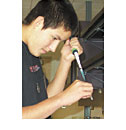 Even though Benjamin Juan's first love is computer science, he says his experiences at the Summer Institute on Medical Ignorance helped him to realize his potential. "I saw it as an opportunity to see what I wanted to do," says Juan, who worked with Lopez and Copeland at the Artificial Heart Program. "The funnest part was how welcome I felt." Like many other students, Juan was surprised by the program's emphasis on question-based education. "I hadn't encountered it before," he says. "It helped me unload myself." Juan says his teachers and classmates at Baboquivari High School were thrilled about his participation in the program. "I kind of saw it (research) as fun," Juan explains."It gave me a lot of pride to say I worked there."
Even though Benjamin Juan's first love is computer science, he says his experiences at the Summer Institute on Medical Ignorance helped him to realize his potential. "I saw it as an opportunity to see what I wanted to do," says Juan, who worked with Lopez and Copeland at the Artificial Heart Program. "The funnest part was how welcome I felt." Like many other students, Juan was surprised by the program's emphasis on question-based education. "I hadn't encountered it before," he says. "It helped me unload myself." Juan says his teachers and classmates at Baboquivari High School were thrilled about his participation in the program. "I kind of saw it (research) as fun," Juan explains."It gave me a lot of pride to say I worked there."
ShanaSue Shallenberger: "I'm not as intimidated as I used to be."
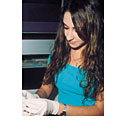 Though some high school participants admit to being entranced by the idea of medical research, ShanaSue Shallenberger says her experiences this summer helped her to focus on more clinical aspects of medicine. "At first I didn't like it (research) at all," explains Shallenberger, a graduate of Flowing Wells High School in Tucson, Ariz. and a new freshman at The University of Arizona. "You have to be a very patient person." Even so, after a summer of working in pharmacology research, Shallenberger says her interest in medicine is stronger than ever. "I've always wanted to be a doctor," Shallenberger says. "I'll never really be satisfied with myself until I become one." The program's emphasis on questioning has helped Shallenberger's learning. She's even begun asking more questions in her college classes. "I think they were good; they made you really think and analyze what you were doing," she says. "I'm not as intimidated to ask questions as I used to be." The program had personal benefits for her, as well. "I met a lot of new people I became really close with," she says. "It was a great experience... I loved it."
Though some high school participants admit to being entranced by the idea of medical research, ShanaSue Shallenberger says her experiences this summer helped her to focus on more clinical aspects of medicine. "At first I didn't like it (research) at all," explains Shallenberger, a graduate of Flowing Wells High School in Tucson, Ariz. and a new freshman at The University of Arizona. "You have to be a very patient person." Even so, after a summer of working in pharmacology research, Shallenberger says her interest in medicine is stronger than ever. "I've always wanted to be a doctor," Shallenberger says. "I'll never really be satisfied with myself until I become one." The program's emphasis on questioning has helped Shallenberger's learning. She's even begun asking more questions in her college classes. "I think they were good; they made you really think and analyze what you were doing," she says. "I'm not as intimidated to ask questions as I used to be." The program had personal benefits for her, as well. "I met a lot of new people I became really close with," she says. "It was a great experience... I loved it."

